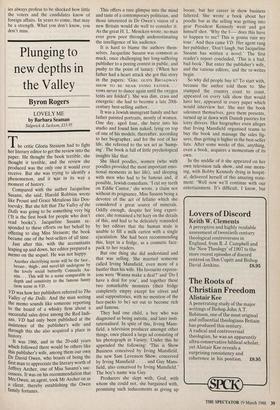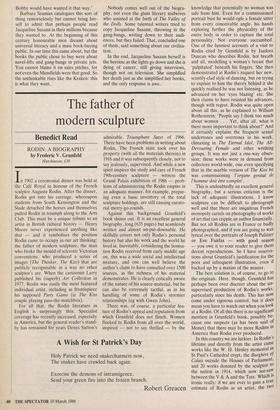Plunging to new depths in the Valley
Byron Rogers
LOVELY ME by Barbara Seaman
Sidgwick & Jackson, £13.95
The critic Gloria Steinem had to fight her literary editor to get the review into the paper. He thought the book terrible, she thought it terrible, and the review she produced was the only one it would ever receive. But she was trying to identify a phenomenon, and it w,as in its way a moment of history. Compared with the author Jacqueline Susann, she said, Harold Robbins wrote like Proust and Grace Metalious like Dos- toevsky. But she felt that The Valley of the Dolls was going to be something very big (`It is the first book for people who don't read books'). Jacqueline Susann re- sponded to these efforts on her behalf by offering to slug Miss Steinem; the book became one of the best-sellers of all time.
Just after this, with the accountants leaping up and down, her editor prepared a memo on the sequel. He was not happy.
Another electrifying scene will be the face-, breast-, thigh-, and navel-lift undergone by the lovely social butterfly Consuela Au- stin. . . This will be a scene comparable in depth and sensitivity to the famous funny
farm scene in VD.
VD was how her publishers referred to The Valley of the Dolls. And the man writing the memo sounds like someone reporting to the board of a whisky firm about a successful sales drive among the Red Indi- ans. VD had only been published at the insistence of the publisher's wife and through this she also acquired a place in history. It was 1966, and in the 20-odd years which followed there would be others like this publisher's wife, among them our own Dr David Owen, who boasts of being the first man to appreciate the literary worth of Jeffrey Archer, one of Miss Susann's suc- cessors. It was on his recommendation that Mrs Owen, an.agent, took Mr Archer on as a client, thereby establishing the Owen family fortunes. This offers a rare glimpse into the mind and taste of a contemporary politician, and those interested in Dr Owen's vision of a new Britain would do well to consider it. As the great H. L. Mencken wrote, no man ever grew poor through underestimating the intelligence of his audience.
It is hard to blame the authors them- selves. Jacqueline Susann was common as muck, once challenging her long-suffering publisher to a peeing contest in public, and pushy to the point of lunacy. (When her father had a heart attack she got this story in the papers: 'GIRL QUITS BROADWAY SHOW TO BE NEAR DYING FATHER. . . vows never to dance again until the oxygen tents are folded'). She was dim, crass and energetic: she had to become a late 20th- century best-selling author.
It was a Jewish immigrant family and her father painted portraits, mostly of women. One day, aged four, she burst into his studio and found him naked, lying on top of one of his models; thereafter, according to her biographer, and for the rest of her life, she referred to the sex act as 'hump- ing'. The book is full of little psychological insights like that.
She liked poodles, women (who with poodles provided the most important emo- tional moments in her life), and sleeping with men who had to be famous and, if possible, Jewish comedians. 'I cut my teeth on Eddie Cantor,' she wrote, a claim not without its poignance, Miss Susann being a devotee of the act of fellatio which she considered a great source of minerals. Oddly enough, despite her long experi- ence, she remained a bit hazy on the details of this, and had to be delicately reminded by her editors that the human male is unable to fill a milk carton with a single ejaculation. She had been recommending this, kept in a fridge, as a cosmetic face- pack to her readers.
But one thing she did understand and that was selling. She married someone called Irving Mansfield, even more of a hustler than his wife. His favourite express- ions were `Wanna make a deal?' and 'Do I have a deal for you', and together these two remarkable monsters (their fridge completely empty except for olives and anal suppositories, with no mention of the face-packs to be) set out to become rich and famous.
They had one child, a boy who was diagnosed as being autistic, and later insti- tutionalised. In spite of this, Irving Mans- field, a television producer amongst other things, once placed a large ad consisting of his photograph in Variety. Under this he appended the following: 'This is Show Business conceived by Irving Mansfield, the new Sam Levenson Show, conceived by Irving Mansfield . . . . and Guy Mans- field, also conceived by Irving Mansfield.' The boy's name was Guy.
Producers she slept with, God, with whom she could not, she bargained with, promising such inducements as giving up booze, but her career in show business faltered. She wrote a book about her poodle but as the selling was getting into gear President Kennedy went and got himself shot. 'Why the f— does this have to happen to me? This is gonna ruin my tour.' And then came VD. Her agent rang her publisher, 'Don't laugh, but Jacqueline Susann has written a novel.' The first reader's report concluded, 'This is a bad, bad book.' But enter the publisher's wife, and the various editors, and the re-writes begin.
So why did people buy it? To start with, because the author told them to. She stumped the country coast to coast, appeared on every talk show that would have her, appeared in every paper which would interview her. She met the book salesmen themselves, gave them presents, turned up at dawn with Danish pastries for lorry drivers. Her biographer even alleges that Irving Mansfield organised teams to buy the book and massage the sales fig- ures, thus getting it higher in the best-seller lists. After some weeks of this, anything, even a book, acquires a momentum of its own.
In the middle of it she appeared on her own television talk show, and one morn- ing, with Bobby Kennedy dying in hospit- al, delivered herself of this amazing state- ment: 'Well now we'll continue with our entertainment. It's difficult, I know, but Bobby would have wanted it that way.'
Barbara Seaman catalogues this sort of thing remorselessly but cannot bring her- self to admit that perhaps people read Jacqueline Susann in their millions because they wanted to. At the beginning of this century honourable men dreamt about universal literacy and a mass book-buying public. In our time this came about, but the books the public chose to buy were about navel-lifts and gang-bangs in private jets. You cannot blame it on sales pitches, for not even the Mansfields were that good. So the unthinkable rises like, the Kraken: this is what they want. Nobody comes well out of the biogra- phy, not even the glum literary midwives who assisted at the birth of The Valley of the Dolls. Some talented writers tried to copy Jacqueline Susann, throwing in the gang-bangs, writing down to their audi- ences, but they failed. That, concluded one of them, said something about our civilisa- tion.
In the end, Jacqueline Susann herself is the heroine as the lights go down and she is dying of cancer, still giving interviews, though not on television. She simplified her death just as she simplified her books, and the only response is awe.

























































 Previous page
Previous page